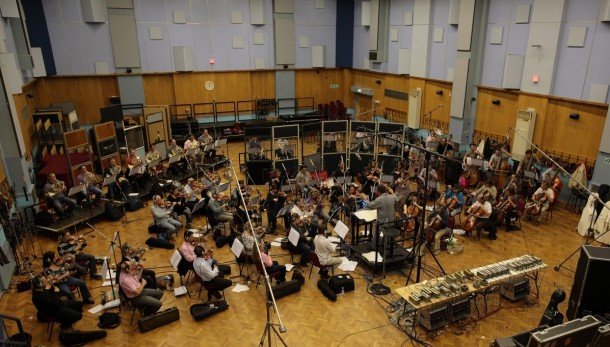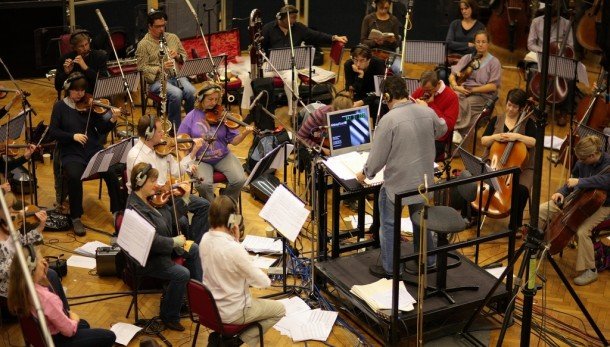[caption id="attachment_150580" align="aligncenter" width="610"]

Schyman conducting at Abbey Road studios for the Dante's Inferno score.[/caption]
Have you seen the understanding, opinions of and respect for game music change over the course of your career?
Yes for sure. I think there are two main developments that have led to the increased respect for game music and composers. One is that the industry itself has become so large, popular and financially successful. That causes the media to take a more serious look at what we're creating. Second, the standards have been raised. The executives running the development teams are more experienced and realize that they have to raise their game - no pun intended - and keep improving the quality of every aspect of it. This in turn permits bigger budgets and better composers becoming interested in the work. That has certainly been true of myself who was not scoring video games, other than a few back in the mid-'90s for a friend, until 2005. I have said this before and I say it again - videogames have permitted me to write some of the most interesting music I have ever been asked to write in any medium. Period!
What do you believe is the key to delivering a great game score?
"Infinite stands in polar opposite to Bioshock the original game in that it glows in light and openness."
Well it really helps to have a great game to score. It's inspiring and brings out the best in a composer. Still, that said, a good composer will deliver a fine score even for mediocre material. Second, you need to have a receptive and very creative developer who truly wants something original and not the more recycled fair we are often asked to write. I would say it helps to have the resources to properly record the music with first class live musicians. And of course it takes an experienced, talented musician to really deliver first rate material. There's a lot of composers out there but it takes a lot of time and experience to get really good and that assumes you start with a modicum of talent to begin with.
It may seem easy to some but once you get deep into the production process, you realize just what an extraordinarily difficult challenge it is to devise and compose a great score to anything. Finally, it helps to have sufficient time to develop and write great music.
Keep up to date with the most important stories and the best deals, as picked by the PC Gamer team.
What can you tell us about BioShock Infinite, its soundscape and how it relates to and co-exists with its world? The distinct, anachronistic art design conjures very specific times and places, did that "box you in" in terms of what you could and couldn't do on the soundtrack?
I certainly can't add much to what Irrational Games has provided publicly. It is a gorgeous, amazing world that they have conjured up. It sort of stands in polar opposite to BioShock the original game in that it glows in light and openness. It is so different and yet it makes sense that it is a “BioShock” game. I did not feel boxed in at all. Every score has to have a point of view and an approach and you're going to use the project you're scoring as your source for inspiration. In fact without limitations we cannot begin to compose.
Stravinsky the great 20th century composer once said, “Give me the entire keyboard (referring to the piano) to compose and I am paralyzed by too much choice. But give me two notes and I can start composing immediately”. In other words, we need the restrictions to compose or to create anything for that matter.
[caption id="attachment_150581" align="aligncenter" width="610"]

Schyman conducting at Abbey Road studios for the Dante's Inferno score.[/caption]
How do you work around an action game with music; Jack Wall recently told me it can be tricky knowing how to punctuate a game with so much peripheral noise like Call Of Duty, did you find the same issues with Bioshock?
No, that was not an issue on BioShock Infinite. I think a combat game like Call Of Duty may present a more complex set of issues for the composer. That said, a composer needs to always be aware of sound fx and dialogue while composing. That's just part of what we must do whether we're scoring a television series or a video game or a film. Infinite did not present any special problems as far as dealing with in-game sound.
What discussions did you have with the team and Ken Levine about the audio direction of the game?
"Understanding what was going on underneath the surface of Columbia was critical to how my music supported the story."
Most of my interactions with Irrational were with Jim Bonney, the music director. At one point I traveled to Boston to meet with the team and I had a few private meetings with Ken. He helped me understand what was going on underneath the surface of Columbia that was critical to understanding how my music needed to support the visual images and story. That, and meeting with various parts of the entire development team was very helpful to giving me the direction I needed to find the right style and temperament for the score. Once I established that I dealt day-to-day with Jim Bonney. He would relay what music was needed next and how it worked in the game. I would mock it up for him and once I found the direction I would record a grouping of cues with the small string ensembles that we used for the score. This music was then played for Ken for his final approval.
Every now and again Ken and I would speak on the phone about style or some upcoming music requirement. Working on a project like BioShock Infinite with designers like Ken are rare experiences, and I cherished this one as much as our previous work together on the original BioShock. Really the peak of creativity for a game composer.
PC Gamer is the global authority on PC games—starting in 1993 with the magazine, and then in 2010 with this website you're currently reading. We have writers across the US, Canada, UK and Australia, who you can read about here.


